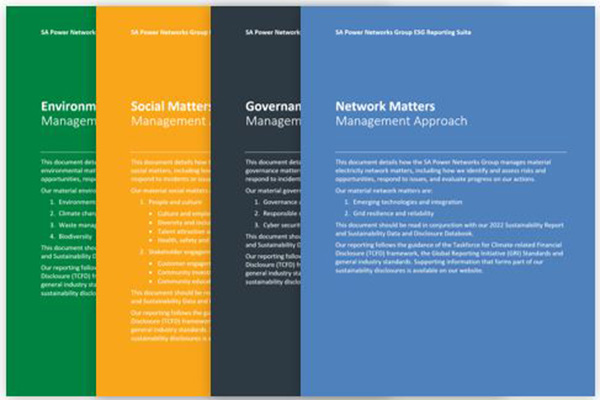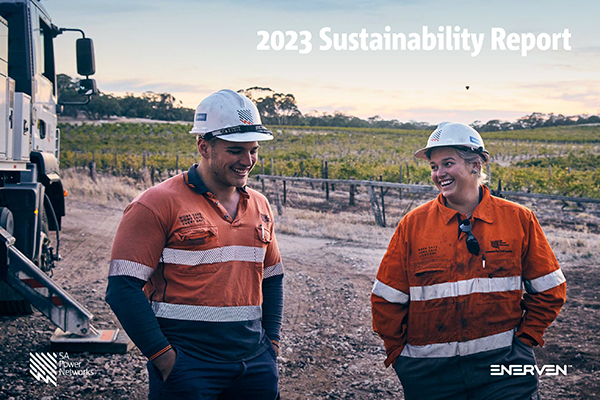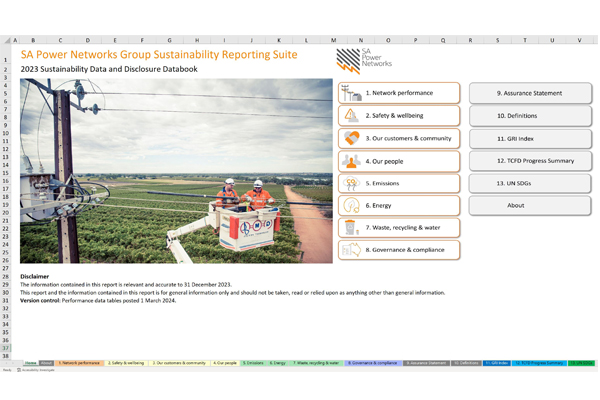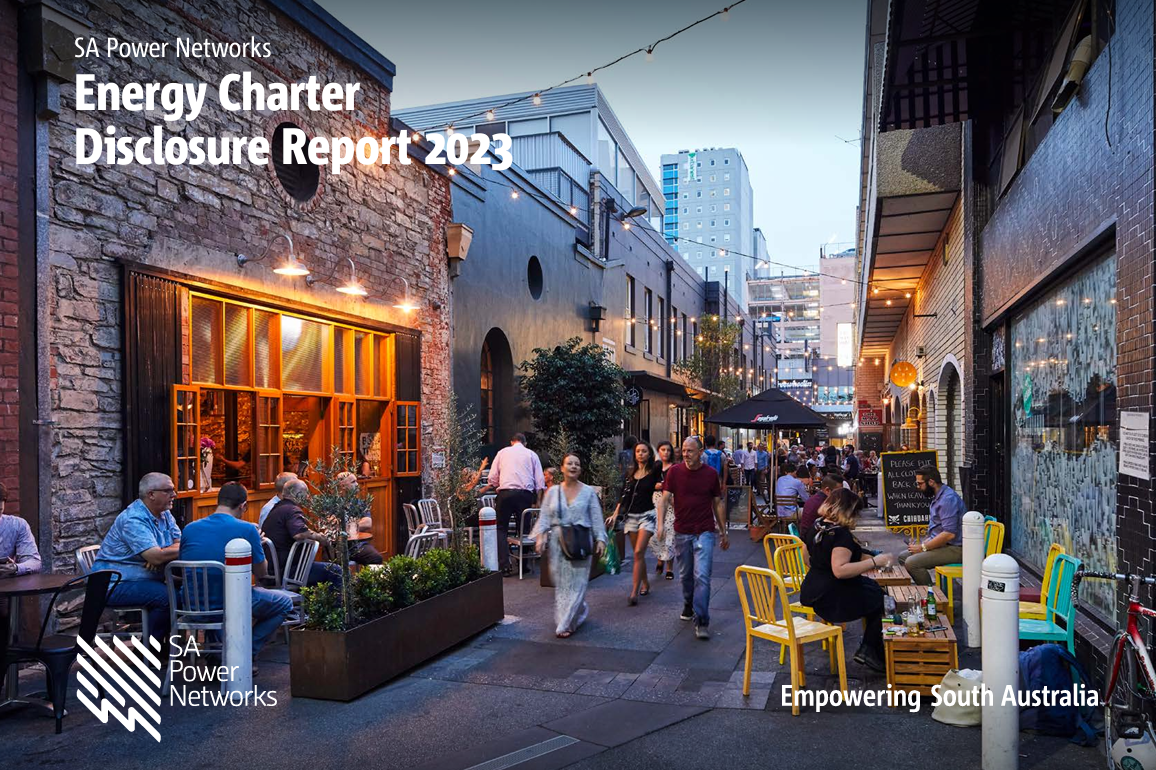Sustainability means meeting our own needs without compromising the ability of future generations to meet their own needs. Sustainability is not just about preserving natural resources and the environment - embedded in most definitions of sustainability are concerns for social equity and economic development.
Sustainability strategy
Our Sustainability Strategy outlines our vision, goal and initiatives to achieve a more sustainable business, community and environment. Our aim is to support and strengthen our customers and communities, collaborate on opportunities with Government and stakeholders, empower our workers, and protect the natural environment.
Strategy on a page
We have laid out a summary of our full Sustainability Strategy on a single page below to make it easier to scan the content.
Download a printable copy of the Sustainability Strategy on a page.
Our Sustainability Reporting Suite
Our sustainability reporting describes how we are addressing the environmental, social and governance (ESG), risks and opportunities that matter most to our stakeholders.
Along with our annual Sustainability (Performance) Report, we produce a number of supporting documents that outline our approach and performance metrics across a range of environmental, social and governance (ESG) matters. Together, these documents comprise our “sustainability reporting suite”, and detail the ESG performance and achievements related to the activities of the SA Power Networks Group during the relevant calendar year.
Reporting suite
Our reporting suite below includes a range of different reports, data and statements including:
- Sustainability (Performance) Report
- ESG Data and Disclosure 'Databook'
- ESG Matters Management and approach statements
Sustainability (Performance) Report
This report documents our progress towards achieving the aspirations and objectives of the Sustainability Strategy and our performance against a range of environmental, social and governance (ESG) disclosures. It focuses on what is material to the SA Power Networks Group, with key themes being:
- our role in transforming energy and decarbonising SA;
- our focus on our customers and the community;
- improving the diversity and wellbeing of our own workforce; and
- minimising our own carbon and environmental footprint.
Published annually for the previous calendar year and publicly available on our website.
Sustainability Data and Disclosure Databook
- SA Power Networks Group sustainability performance data.
- Disclosures against Global Reporting Initiative (GRI), Taskforce on Climate-Related Financial Disclosures (TCFD), United Nations Sustainable Development Goals (UN SDGs)
A copy of the Sustainability Data and Disclosure Databook is published annually for the previous calendar year and publicly available on our website.
Our ESG priorities
Our reporting focuses on what is material to the SA Power Networks Group, with key themes being:
- our role in transforming energy and decarbonising SA;
- our focus on our customers and the community;
- improving the diversity and wellbeing of our own workforce; and
- minimising our own carbon and environmental footprint.
Find out more about how we approach each of these areas by selecting the relevant section below.

This document details how the SA Power Networks Group manages material environmental matters, including how we identify and assess risks and opportunities, respond to incidents or issues, and evaluate progress on our actions.
Our material environmental matters are:
- Environmental aspect (risk) management
- Climate change and greenhouse gas emissions
- Waste management and contributing to a circular economy
- Biodiversity
Additional resources for Environmental Matters
This document details how the SA Power Networks Group manages material social matters, including how we identify and assess risks and opportunities, respond to incidents or issues, and evaluate progress on our actions.
Our material social matters are:
- People and culture
- Culture and employee engagement
- Diversity and inclusion
- Talent attraction and workforce development
- Health, safety and wellbeing
- Stakeholder engagement and community investment
- Customer engagement
- Community investment and economic development
- Community education and safety
Additional resources for Social Matters
This document details how the SA Power Networks Group manages material governance matters, including how we identify and assess risks and opportunities, respond to incidents or issues, and evaluate progress on our actions.
Our material governance matters are:
- Governance and risk management
- Responsible supply chain
- Cyber security
Additional resources for Governance Matters
- Modern Slavery Statement
- Cyber Security information
- Regulatory information
This document details how the SA Power Networks Group manages material electricity network matters, including how we identify and assess risks and opportunities, respond to issues, and evaluate progress on our actions.
Our material network matters are:
- Emerging technologies and integration
- Grid resilience and reliability
Additional resources for Network Matters
Energy Charter Disclosure Report
In 2023 SA Power Networks became a signatory to the Energy Charter, a unique CEO-led coalition of organisations across the energy supply chain with a shared purpose and passion for customers and communities.
As part of their commitment to the Energy Charter, Full Signatory CEOs agree to publicly disclose how they are delivering against the five Energy Charter Principles.
Our first Disclosure Report is available here, outlining our maturity against the Energy Charter Principles, our achievements in 2023 and where we intend to progress to in 2024.
Reporting principles and frameworks
Our reporting follows the guidance of the Financial Stability Board’s Taskforce for Climate-related Financial Disclosures (TCFD) Framework, the Global Reporting Initiative (GRI) Standards and general industry standards. We believe we can provide a significant contribution towards five of the 17 Sustainable Development Goals (SDGs). Our carbon footprint is derived from our annual reporting under the National Greenhouse and Energy Reporting Act (2007).
Our sustainability and ESG reporting is guided by a number of key principles including:
-
Sustainability vision and corporate strategy
Our Sustainability Strategy and Plan are linked directly to and aim to deliver on the aspirations outlined in our Strategic Direction 2035. -
Sustainability governance and management
We have refreshed our sustainability governance, oversight and management frameworks to reflect the elevation of ESG across our business, including establishment of a Board Sustainability Committee. - Materiality and value chain
We focus on the ESG risks and opportunities that matter to our stakeholders (employees, community, owners, governments, regulators and suppliers). We have commenced a value chain mapping process to better articulate the activities, impacts, and outcomes along the value chain. - Metrics and targets
Metrics and targets are defined and disclosed for material topics and are linked to our Sustainability Strategy to enable performance monitoring. Metrics with targets still undergoing refinement or development are disclosed for transparency. - Balance, transparency and consistency
We aim to discuss and disclose both the negative and positive aspects of our sustainability performance, and to utilise nationally and globally recognised reporting methodology and protocols.


